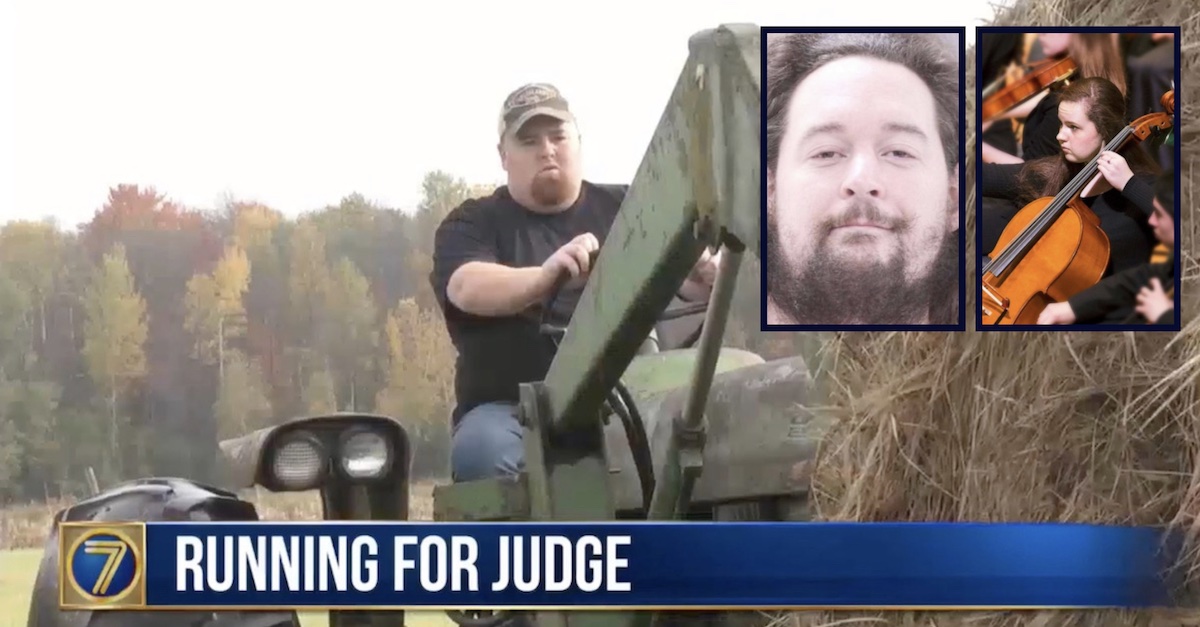
Judge Gregory Storie riding a tractor during a 2020 profile on his candidacy (WWNY/screengrab), Michael Snow (center) and (right) Elizabeth Howell (New York State Police)
A judge who recused himself from a murder case that received wide attention in the upstate New York region made “inappropriate” remarks and engaged in misconduct in chambers by pushing a defendant he called “catatonic” towards a plea deal and maximum sentence based on optics, a censure recommendation revealed.
The New York Commission on Judicial Conduct announced the early April determination on Monday as to St. Lawrence County Judge Gregory Storie for his misconduct behind closed doors in the case of Michael Snow, now 33.
Snow eventually pleaded guilty before a different judge and was sentenced to 22 years to life in prison for using a ghost gun to shoot 21-year-old SUNY Potsdam Crane School of Music senior and cellist Elizabeth Howell as she walked near campus in February 2022.
The prosecution had described the murder as a “random act of violence,” but Snow’s motivation was later revealed to be carrying out a revenge plot against the school several years after he lost a job.
Judge Craig Carriero was the jurist who sentenced Snow last summer, and that is because Storie officially stepped aside from the case on January 18, 2023.
The commission’s findings, which included agreed upon facts, said that the complaint against Storie was traceable to a Jan. 5, 2023, conference session in his chambers, where St. Lawrence County Public Defender James M. McGahan — Snow’s lawyer — and St. Lawrence County Assistant District Attorney Michael Abbruzzese were present and discussing cases unrelated to Howell’s murder.
Though St. Lawrence County District Attorney Gary Pasqua was not present and though the Snow case was not on the schedule, the documents said, Storie nonetheless brought up the case unprompted and pushed to resolve it in violation of Rules Governing Judicial Conduct; the judge indicated that Snow appeared “catatonic” but still encouraged a guilty plea to second-degree murder — while at the same time promising a maximum sentence so Howell’s family and the media would not condemn the punishment.
“Notwithstanding that People v. Snow was not scheduled to be conferenced, and in the absence of Mr. Pasqua, respondent raised the topic of the possibility of the Snow case being resolved by a plea to the indictment. When Mr. McGahan reported, in sum or substance, that the District Attorney’s Office had offered to permit the defendant to plead to the indictment and leave sentencing to the court’s discretion, respondent stated, in sum or substance, that he would sentence the defendant to the maximum of 25 years to life because anything less would not look good in the media or to the victim’s family,” the documents said. “When Mr. Abbruzzese asked respondent what incentive the defendant would have to plead under that circumstance, respondent stated, in sum or substance, that the defendant might do so rather than proceed to trial because he appeared to be ‘catatonic.'”
Lawyers for the prosecution and defense followed that up by formally seeking the judge’s recusal 13 days later, and he obliged.
But according to the commission’s determination, Storie claimed not to remember making the remarks and added that he didn’t actually think Snow was “catatonic”:
A. Respondent acknowledges having made the comments described in paragraph 8 based on Mr. Abbruzzese’s and Mr. McGahan’s recitations of the January 5 conference. While he does not specifically remember making the comments, respondent acknowledges that they were inconsistent with his judicial responsibilities.
B. Respondent did not actually consider the defendant to be “catatonic” or otherwise incapacitated. If he had, he would have ordered him to undergo an examination pursuant to Article 730 of the Criminal Procedure Law. Nevertheless, respondent acknowledges his comment to that effect was inappropriate.
While the judge was described as “cooperative and contrite,” as well as regretful that he appeared to be motivated by staving off negative press, the commission called it “troubling” that the offending comments in chambers came just two weeks after Storie had been issued a private warning for other conduct from when he was running for office or while he was “relatively new” to the St. Lawrence County court.
The commission noted that a “Letter of Dismissal and Caution” sent confidentially to the judge related to three separate issues, one of which was his failure to recuse himself in a case where relatives were involved:
In December 2022, Judge Storie was privately cautioned by the Commission for (1) publicly endorsing other candidates for elective office, and posting and/or soliciting posts of photographs of voted ballots on his campaign’s Facebook page; (2) failing to disqualify himself from a matter notwithstanding that he was related to the victim and the victim’s mother, a witness in the case; and (3) arbitrarily increasing bail following an application for bail reduction.
The cautionary letter had urged Storie to “reflect on the qualities of restraint and thoughtful deliberation that contribute to one’s success as a judge[.]”
Storie is set to continue on the court until the end of 2030.
Read the New York Commission on Judicial Conduct’s determination here.
Have a tip we should know? [email protected]

.jpeg) 1 week ago
11
1 week ago
11











 English (US)
English (US)